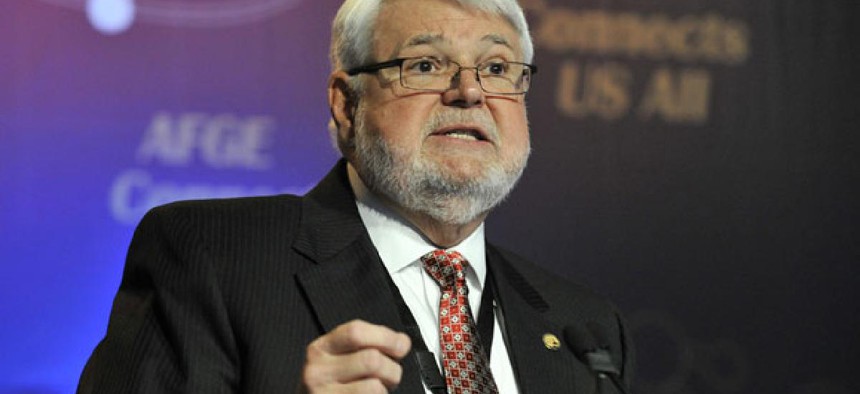
AFGE president J. David Cox also said it’s not necessary to increase the amount federal employees contribute to their pensions. AFGE photo
Protecting federal pay and benefits remains top priority for union
AFGE will maintain vigilance over proposals to reduce feds’ compensation as fiscal cliff looms.
Protecting federal workers’ pay and benefits remains a top priority as attention turns to how Congress and the Obama administration will handle the looming fiscal cliff, said the leader of a large federal employee union the day after the 2012 presidential election.
J. David Cox, president of the American Federation of Government Employees, expressed confidence during a conference call with reporters that feds will receive a pay raise in 2013, and that it will be made retroactive to January. President Obama, re-elected to a second term on Tuesday, has recommended a 0.5 percent pay increase for feds when Congress passes a budget next year. Obama and lawmakers extended the current two-year civilian pay freeze through March 27, when the current continuing resolution keeping the government running expires.
Cox also said it’s not necessary to increase the amount federal employees contribute to their pensions because “federal employee retirement is fully funded.” Many lawmakers want to make feds pay more for their retirement benefits, and Obama also has proposed increasing the amount employees kick in for their pensions. Feds hired after Dec. 31, 2012, and those rehired with less than five years of service under the Federal Employees Retirement System, will have to contribute 3.1 percent to their pensions in addition to Social Security contributions and Thrift Savings Plan contributions. Current FERS employees pay 0.8 percent of each paycheck toward their defined retirement benefit, in addition to the Social Security and TSP contributions. The Civil Service Retirement System covers employees hired before 1984; those workers contribute 7 percent and do not make contributions to Social Security.
“Number one, we are going to be bitterly opposed to any hit on federal benefits and pay,” Cox said, adding that AFGE will continue to make its case to lawmakers about the valuable services government workers provide. “We will be out there, fighting and vigilant,” said Cox. “I haven’t slept much in the last 30 days, and I don’t intend on sleeping much in the next 30 days.” The government is facing what officials refer to as the “fiscal cliff” at the end of 2012 and the beginning of 2013 -- a range of expiring tax cuts, sequestration and another round of negotiations over the debt ceiling.
The National Treasury Employees Union also vowed to protect federal workers’ pay and benefits as Congress begins negotiations over the fiscal cliff. “NTEU will work to avoid the mandatory budget cuts but will not support any proposals that are harmful to federal employees, including negative impacts on their pay and benefits,” President Colleen Kelley said in a statement. “When the new Congress begins in January, NTEU will work with the administration and Congress to get the federal pay raise back on track, as well as fighting potential efforts to raise employee pension contributions.”
Cox said during the conference call that the American public voted overwhelmingly for “tax fairness,” and that any move to increase the amount feds contribute to their pensions is effectively a tax increase. “We do not believe there is a fiscal cliff, we believe there is an income problem,” Cox said, adding that Congress should let the Bush tax cuts expire so that the wealthiest Americans pay “their fair share.” Federal employees, who have been under a pay freeze since 2011, are not “an ATM for Congress,” he said.
If the across-the-board spending cuts known as sequestration take effect and agencies are faced with furloughs, it’s vital to protect front-line workers, Cox said. “We believe that at many of the federal agencies, there are numerous layers of management that the government could do without, but we need the front-line workers.”
Cox waxed poetic about Obama’s re-election. “As I’ve been telling reporters all morning, I’m not on Cloud 9. I’m on Cloud 29,” he said. “I am very excited that voters have given him another four years.” Although federal employee unions have not always agreed with Obama on issues affecting the government workforce, the prospect of a Romney-Ryan administration was anathema to them. “He made very clear from the beginning that he didn’t like government, and he didn’t like unions, and we are both,” Cox said of the GOP nominee.







